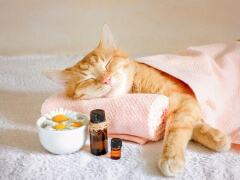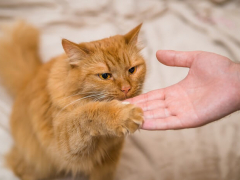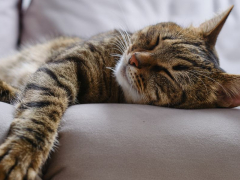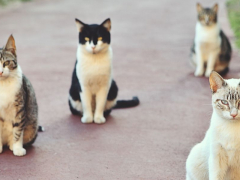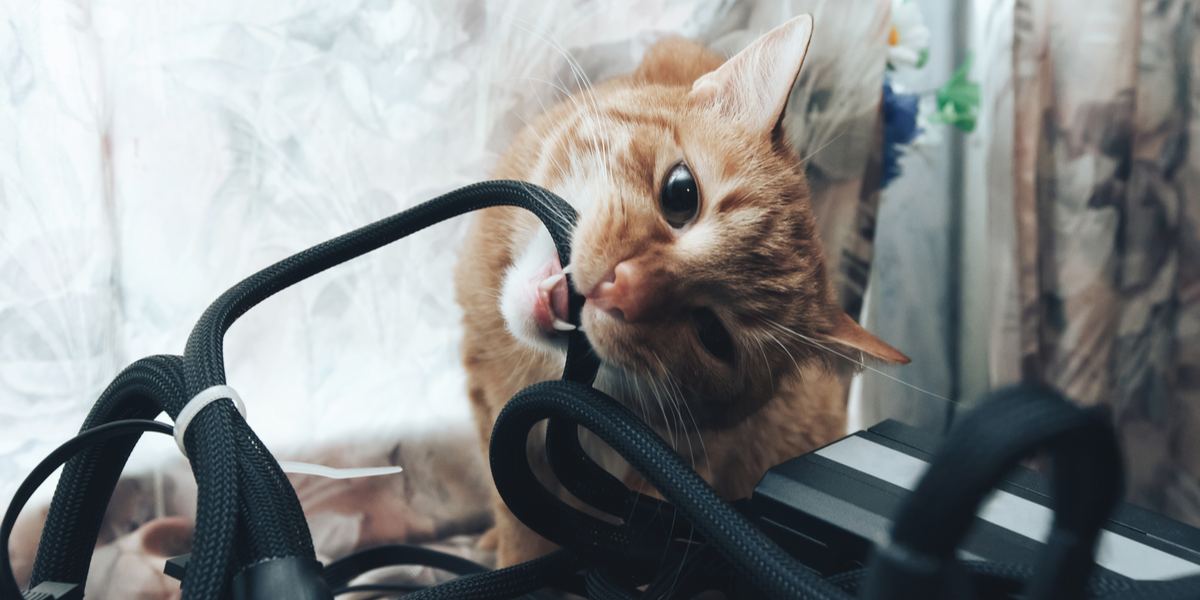
All cat owners just want to keep their cat safe and happy, so making sure that your home is suitably cat-proof is essential. Electrical cords, or power cords, are found in pretty much every modern home, but if cats chew electrical cords it can lead to burns or even electrocution.
There are plenty of safety measures with electrical wires you can put in place to keep your cat safe. Understanding normal cat behavior is also useful to answer the question “Why does my cat chew?” and what you can do about it.
Chewing on electrical cords can lead to serious harm, including burns, lung damage due to an electrical shock, or even fatal electrocution. Make cords less tempting by covering them with double-sided tape or using Velcro to bundle them out of reach. For determined cats, coat the cords with bitter apple spray, hot sauce, or menthol spray, flavors cats hate. Key Takeaways
Why Do Cats Chew?
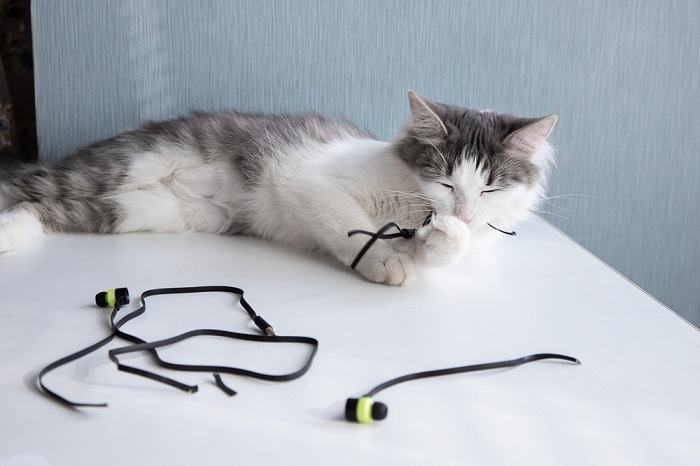
If you can understand the reasons why cats chew in the first place, you may be able to keep your cat away from any dangers. Cats can chew for a variety of reasons, and figuring out your cat’s behavior is important. Here are some common reasons for chewing.
Health Problems
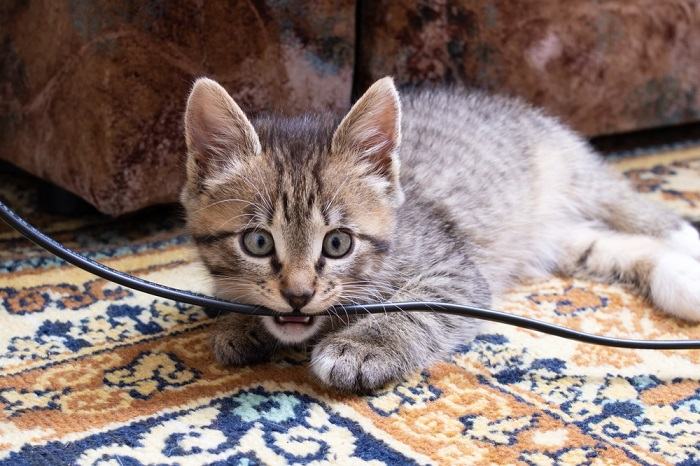
There are some medical concerns that might cause a cat to chew or gnaw at certain things.
- Cats with dental problems may chew to gain relief from sore gums.
- Cats with digestive problems may chew to stimulate drooling to calm their tummies.
- Pica—if a cat’s diet doesn’t provide a certain nutrient, they may develop a condition called pica, which causes cats to eat all sorts of non-food things.
If you suspect a health problem, or just want some reassurance, a checkup with a veterinarian to rule out disease is invaluable. Special attention should be paid to your cat’s teeth and gums as the most likely source of problems.
Teething
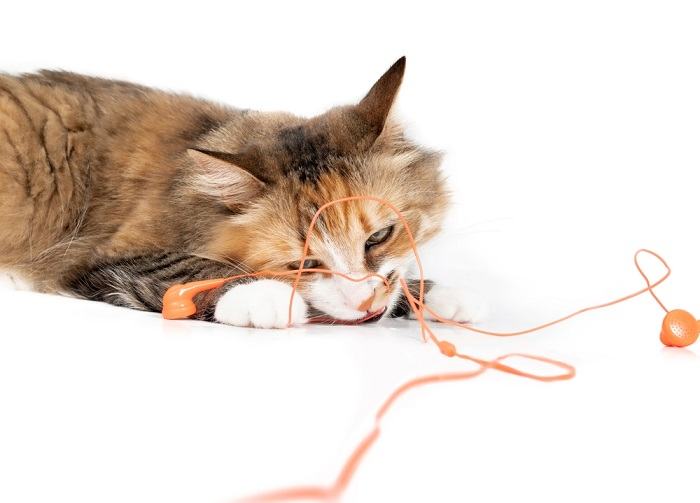
Kittens are especially prone to chewing, and this is likely because their adult teeth are coming through and causing gum pain. The gnawing action of chewing on something hard, and the drooling involved can help soothe sore gums.
Also Read: Best Dental Cat Treats
Exploration
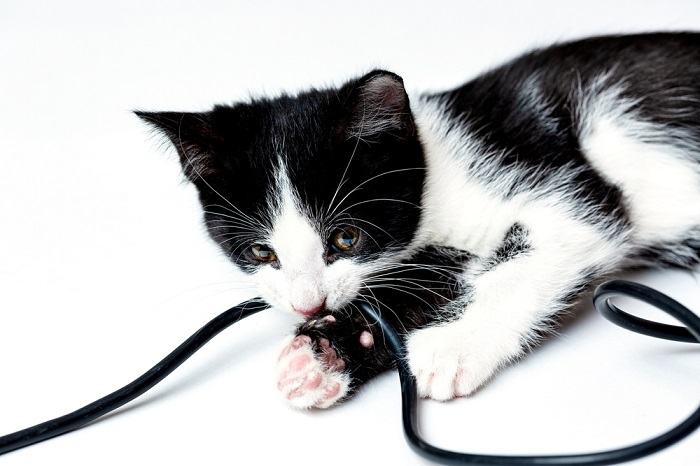
Cats explore new objects first with their whiskers, and then with their mouths, as sight is not a primary sense for a cat. This is, again, especially true of kittens. Cats found chewing on a cord may not be expressly trying to chew it, but are just trying to investigate it.
Boredom Or Lack Of Stimulation
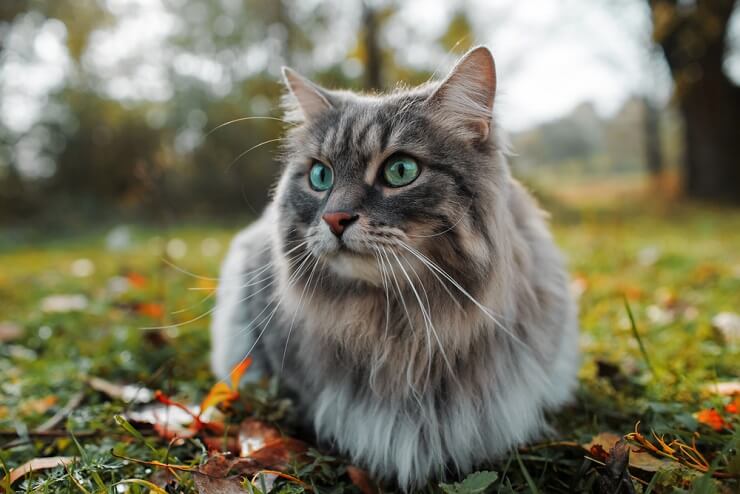
This is especially true for indoor cats, who might not have as much physical and mental stimulation as an outdoor cat. Chewing behaviors can start as a response to boredom or frustration, but can quickly become an ingrained habit and comfort behavior. Some cats become so determined to chew that it becomes an obsessive-compulsive disorder.
Hunting Behavior
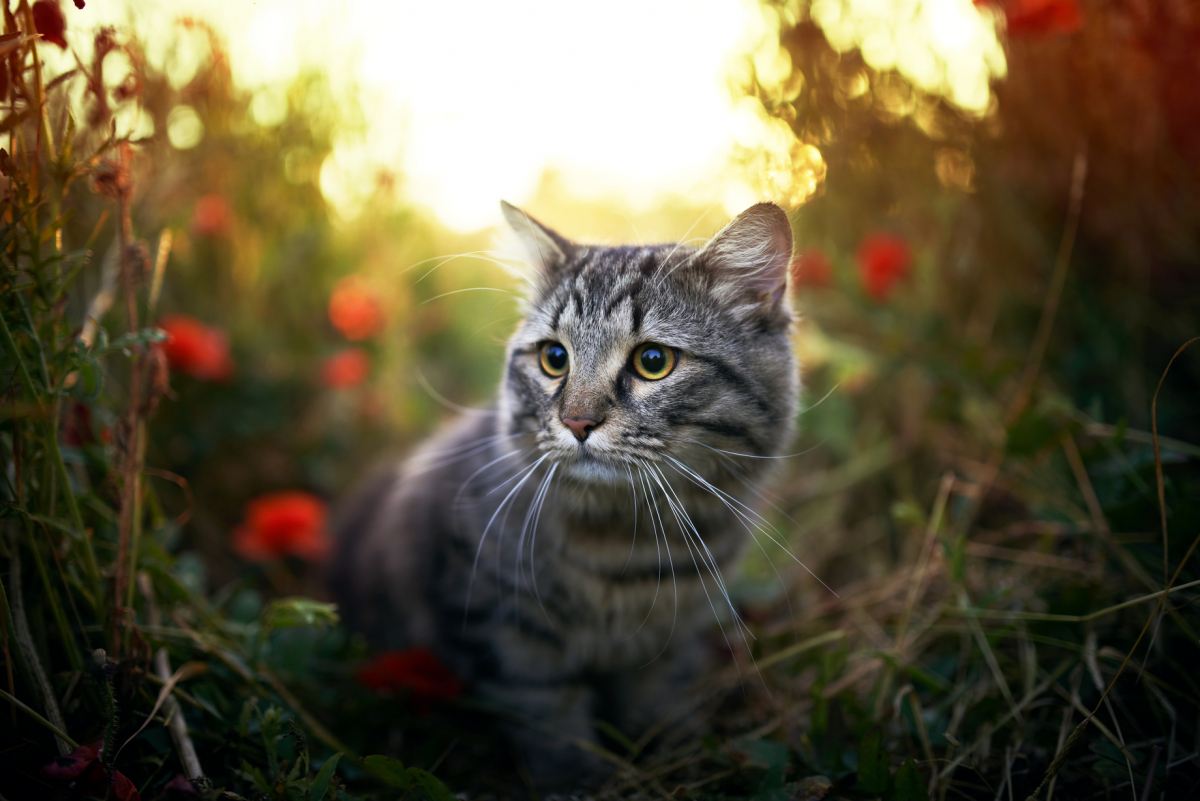
Our cats’ ancestors would usually hunt their prey, and then need to spend time chewing these unfortunate victims to be able to swallow and digest. Modern cat food, either kibble or wet food, doesn’t provide the same stimulation for the jaw and teeth. Some cats try to replicate this by chewing objects.
Also Read: What To Do If Your Cat Chews On Everything
If your cat is chewing on unsuitable things, a checkup with a veterinarian is always recommended to rule out medical causes before focusing on their environment and behavioral needs.
Why Does My Cat Chew Electrical Cords?
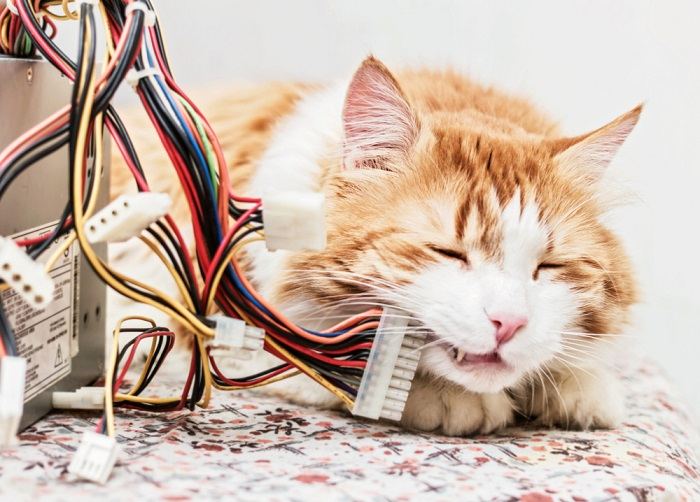
Chewing on electrical cords is extremely dangerous for cats due to the risk of burns and even electrocution.
It may seem like an odd choice for a chew toy, but cats are completely unaware of the danger that electrical wires pose. Power cords, chargers, and other objects with dangling cords just look like an excellent excuse for playtime to our feline friends—especially kittens. Some cats like certain textures to chew on, and cables or cords can be satisfying for cats to gnaw on.
How Do I Stop My Cat From Chewing Electrical Cords?
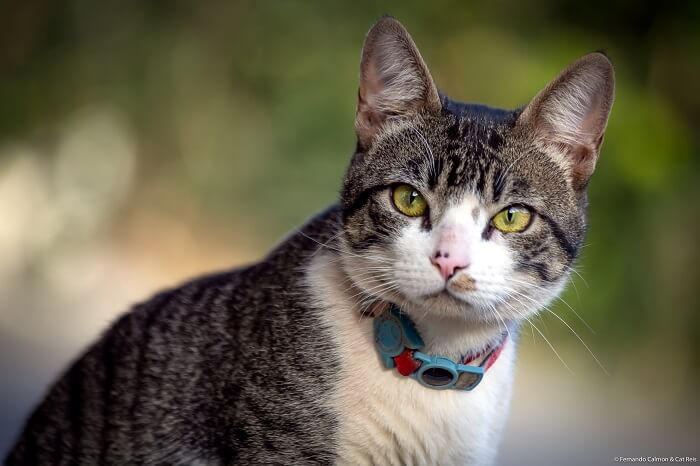
Keeping your cat safe is essential, so if you’re concerned that your cat is a chewer and you have electrical wires in your house, here are some top safety tips. It is especially essential to cat-proof your house before getting a kitten, as they can very quickly get up to mischief!
- Get tidying! Where possible, never leave cords out. Tidy away your laptop and phone chargers when not in use, and never leave wires dangling in unsupervised areas.
- Keep all electrical cords well secured. Dangling cords are just irresistible to cats. Use double-sided tape or Velcro to affix electrical wires to each other in bundles and then fix them out of harm’s way. Running wires along walls makes them much less accessible to chew.
- If you can’t fix wires out of the way, use cord covers to keep the electrical wires protected from cat’s teeth. Rubber covers, PVC pipes, or PVC covers are all available and many pet stores will stock them.
- If there have to be unsecured or uncovered wires on the floor, apply double-sided tape to the floor around them as cats hate to walk across the sticky tape. This may have to be renewed regularly.
- The most determined cats may even try chewing despite the above measures. In these cases, it’s time to bring out the bitter apple spray, hot sauce, Vicks, or menthol spray to really keep the cats away. Cats hate these flavors, and after a few encounters, you should find they give up in disgust. While they are learning, you may have to reapply regularly. Bitter sprays can be purchased from pet-supply stores and online.
- Provide an alternative for your cat. Chewing can be an important cat behavior, and having some chew toys, such as rawhide or cat grass, can help prevent boredom as well as being good for the cat’s teeth to prevent dental problems. Try a variety of chews and toys until you find the texture that your cat likes best.
Also Read: The 10 Best Chew Toys for Cats
What Happens If My Cat Chews An Electrical Wire?
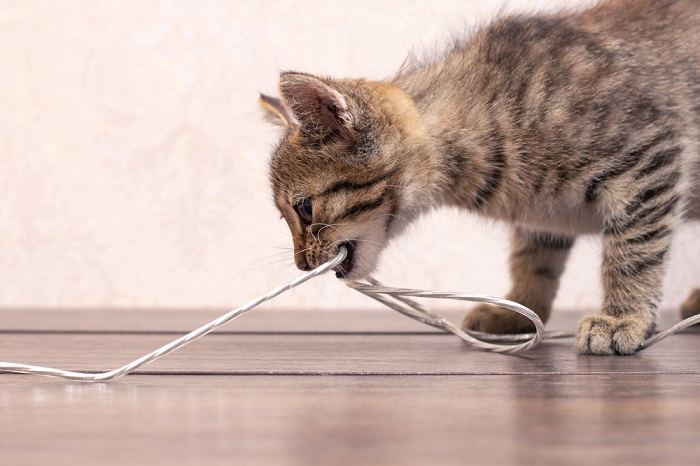
If you think your cat might have received a strong electrical shock from chewing on a cord, contact your veterinarian immediately.
Power cords are dangerous things. Depending on the voltage of the wire, your cat may suffer a minor shock through to fatal electrocution. Electric shocks can result in lung damage, leading to difficulty breathing, and burns are common and can be severe. Prevention is most definitely better than cure in this scenario.
Summing Up
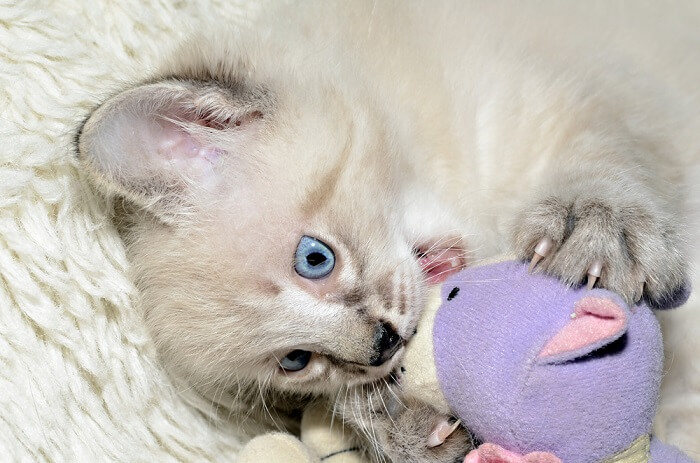
Electrical wires are dangerous, and cats may see them as a boredom-busting toy or teething aid. Keep power cords out of harm’s way, cover them, and spray them with bitter-tasting sprays to keep your cat protected. Provide appropriate chew toys for mental and physical stimulation instead.
Frequently Asked Questions
Why is my cat chewing on cords?
Cats chew for many reasons, including dental problems and boredom. Dangling cords are especially attractive to cats and kittens as they look like toys. Some cats also love certain textures to chew on and the rubbery texture of power cords can be preferred.
Why does my kitten chew everything?
Cats explore new things with their mouths. Kittens have the added bonus of being both insatiably curious and teething, which means they are liable to play and chew on anything they come across, dangerous or not!
What taste do cats hate?
Using sprays with distasteful flavors to cats can be handy to repel them from things you don’t want to be chewed. Bitter apply spray, menthol, or hot sauce are all good ones to try.



